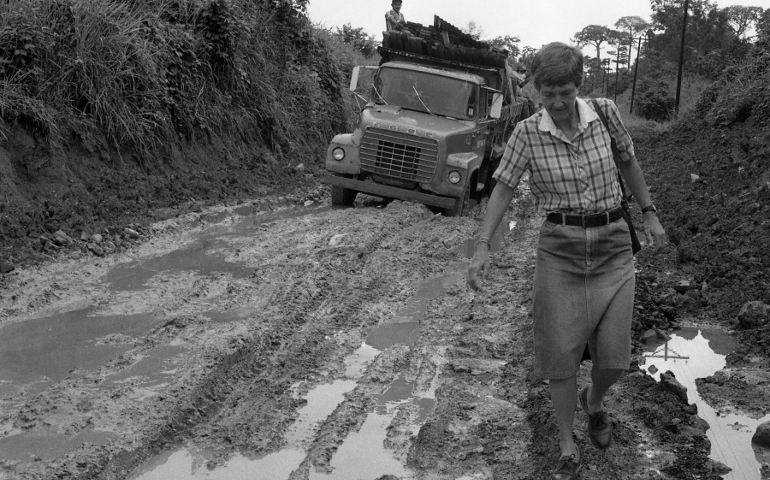
Sr. Melinda Roper walks along a muddy road in Panama, 1988. (Provided by Maryknoll Sisters)
From her mission deep in Panama's rainforest, Sr. Melinda Roper embraces a human rights focus much broader than the one that thrust her into the international spotlight nearly four decades ago.
Roper was at the helm of the Maryknoll Sisters of St. Dominic on Dec. 2, 1980, when four U.S. churchwomen — two of them Maryknoll sisters — were murdered in El Salvador. She was just 40 when elected two years earlier to lead the congregation, which had missions in Asia, Africa and the Americas and traced its history to 1912.
Under her leadership, the Maryknoll sisters fought for justice, for the churchwomen and for those they represented. At a time when Americans were mostly unaware of the U.S. role in training and financing right-wing death squads terrorizing much of Central America, the Maryknolls awakened the faith community in particular and the country in general.
The churchwomen became a symbol for a system that was repressing and killing tens of thousands of innocents, many simply for the profession of their faith. Their deaths helped inspire Central American solidarity groups throughout the U.S. and a sanctuary movement that gave shelter to refugees fleeing the violence.
Global Sisters Report sought out Roper in Panama, where she has spent the past 32 years building a pastoral community in the remote tropical wilderness of Darién province. Her human rights focus and spiritual growth have expanded to encompass the connection between environment and spirituality.
"I encourage all of us to try to understand more of what science is telling us today. … Science and spirituality are not contradictory but complimentary; they're the principles on which the universe functions," she told GSR. "In all of nature and all of the universe, everything tends toward interconnecting and interrelating. Another word would be to be 'in communion' with everything."
Recently, together with other sisters in Panama, she launched a new program called "Web of Life," an educational retreat focusing on faith, science and the ecosystem, which GSR will be sharing with readers in a "virtual travelogue" beginning June 22. First, here is her story.
From Midwest to Mesoamerica: The early years
On many levels, Melinda Roper was not a likely candidate to be a nun. The daughter of a teacher who was Catholic and a union electrician who was not, she grew up in Chicago in "a very open religious culture," going to Mass on Sundays but to public school, so knew nothing of nuns or of religious life.
"I don't know how it occurred to me to go to a Catholic high school," she says of her choice to attend St. Scholastica Academy, a Benedictine school in Chicago. "There's always a part of religious vocation that's mystery — something you're drawn to and you're not even aware of, perhaps. What attracted me was not so much to be a religious but the whole experience of learning how to pray, learning how to reflect."
Still, she couldn't imagine herself as a Benedictine sister. She mentioned this to a sister who said, " 'Let's look around and see what we can find.' She found a Maryknoll magazine and said, 'Maybe this is the kind of thing for you.' "
"As soon as I saw Maryknoll I said, 'There, that's something I would be interested in,' " she recalls. "I think it was the combination of deep learning, being drawn into reflection, into mystery and prayer…and I think to be honest it was a sense of adventure, a sense of the unknown."




